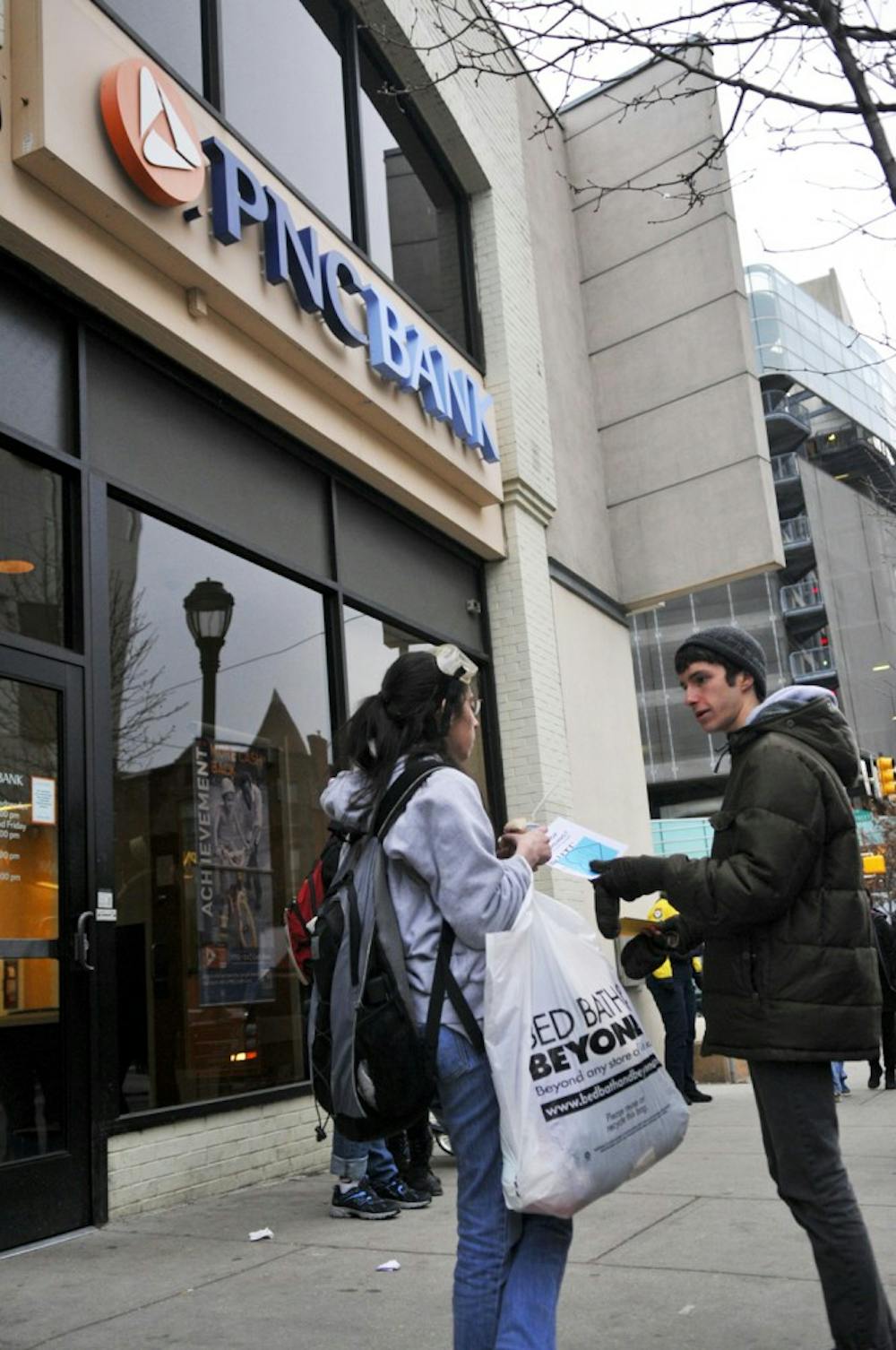
The Penn Community Against Mountain Top Removal celebrated Valentine’s Day a little differently by continuing their ongoing activism.
The student group campaigned yesterday, national I Love Mountains Day, to gather student signatures pledging to withdraw their bank accounts from PNC Bank — with which Penn has a long-standing relationship — by the end of the semester.
Mountaintop removal is a method of coal mining that the group says is both cheap and damaging to the environment. PNC currently invests in a company that engages in this practice.
Penn Community Against MTR has been working with the administration throughout their campaign, which began last September. The administration released an official statement to the group yesterday about its relationship with PNC.
“We will certainly consider your views in any contract renegotiation,” the statement read. “Consistent with [Penn’s Climate Action Plan], as we consider future banking vendors we will take into account each bank’s qualifications and relevant circumstances with regards to Penn’s Supplier Code of Conduct at the time of any new contract.”
Vice President for Finance and Treasurer Stephen Golding, Associate Vice President for the Division of Business Services Christopher Bradie and spokesperson for the Office of the Executive Vice President Tony Sorrentino signed the statement.
As part of yesterday’s efforts, Penn Community Against MTR set up stands on Locust Walk and in front of PNC at 40th and Walnut. They collected 18 signatures.
“Our goal is to have 500 people [move their accounts] for the 500 mountains that have been destroyed,” said Russell Trimmer, Penn Community Against MTR member and Wharton senior.
All University suppliers must adhere to Penn’s Supplier Code of Conduct, which includes standards for environmental, occupational health and safety and labor practices.
The code of environmental practices includes obtaining valid environmental permits, proper handlings and disposition of hazardous materials and properly treating discharges from operations.
Penn Community Against MTR is urging students to transfer their PNC accounts to the Student Federal Credit Union, which the University also partners with.
PNC currently offers many special benefits to Penn students with accounts. Students are able to link PennCards with their bank accounts. It has two branches and 22 bank ATMs on and around campus.
SFCU also offers the option for students to use their PennCards as ATM cards. It also has lower fees and higher interest rates, according to Trimmer.
“In the end, it gives more power to students to decide what they want their money to fund,” he said. He added that his group has faced difficulty in getting students to transfer to SFCU due to a “stigma against it.”
There are 22 ATMs on and around campus that will accept linked PennCards.
“The idea that [SFCU is] run by students is hard to wrap your head around,” he said.
PNC declined to comment and SFCU did not respond to requests for an interview.
“People have been receptive,” said Madison Roberts, Penn Community Against MTR member and College sophomore. “It’s all about spreading the word — it’s a big commitment to close a bank account, so we want to spread the word so that people can make informed decisions.”
Trimmer added that the point was just to get PNC to stop financing mountaintop removal by putting pressure on the bank.
“Even if all of Penn withdrew [their accounts], it wouldn’t matter financially,” he said.
“[MTR is] a political and human rights issue,” said Abby Waldorf, Penn Community Against MTR member and College senior. MTR has serious and often fatal health consequences, according to Waldorf.
“The amount of sludge spilled from MTR basins is ten times greater than the British Petroleum oil spill, and no one has heard of [MTR],” she added.
The Penn and Temple University Communities Against MTR met privately with PNC executives on Jan. 23.
“It’s clear PNC won’t make changes to their portfolio without outside pressure,” Danny Teich, Temple Community Against MTR member and Temple senior, said in a January press conference.
The two groups are planning to expand their campaign and will continue outreach to the 35 other schools that partner with PNC.
The Penn Community Against MTR will also work with the Undergraduate Assembly on a resolution to encourage the University to give more priority to SFCU and reevaluate its relationship with PNC, Trimmer said.
The campaign is to “show that a sustainable and just economy is important to us,” he said.
Related
PNC execs talk policy with students
Your Voice | Concerns with PNC Bank
The Daily Pennsylvanian is an independent, student-run newspaper. Please consider making a donation to support the coverage that shapes the University. Your generosity ensures a future of strong journalism at Penn.
DonatePlease note All comments are eligible for publication in The Daily Pennsylvanian.




